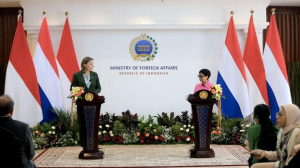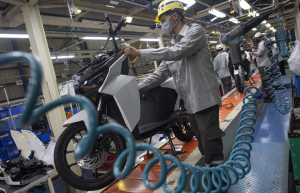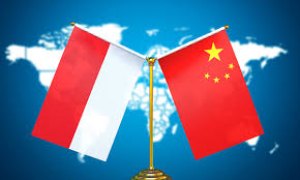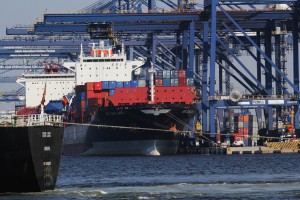Indonesia, Netherlands seek to expand dairy industry cooperation
The Indonesian Ministry of Industry explores cooperation and investment opportunities with the Dutch government and companies in the provision of dairy cows to spur the development of Indonesia’s dairy processing industry.
According to the Ministry of Industry Director General of Agro Industry, Putu Juli Andhika, quality dairy cow supply needs to be strengthened to meet the demand for Domestic Fresh Milk (SSDN) as raw material (for dairy products), related to increasing the productivity of the industry.
In a press release issued on Wednesday (26/4), Ardika said that the ministry had conducted a working visit to the Netherlands along with the representatives from the Indonesian Embassy in Brussels as well as the Indonesian Embassy in The Hague in mid-April 2023.
The Indonesian delegation held meetings with the Dutch Ministry of Agriculture, Nature, and Food Quality (LNV), The Netherlands Agricultural and Horticultural Association (LTO), a Dutch multinational dairy cooperative FrieslandCampina N.V., and some dairy farmers fostered by the cooperative.
Ardika stated the working visit also aimed at observing the implementation of modern and sustainable dairy farming in the Netherlands.
He remarked that the Indonesian delegation’s visit received a positive response from LNV and LTO.
“[The dairy processing industry players in] the Netherlands have various potentials that can be explored further with various parties in Indonesia, especially with private parties, who are interested in investing in [the supply of] dairy cows,” Ardika added.
According to Ardika, several big dairy processing companies in Indonesia were interested in buying 8 to 16 thousand Holstein dairy cows originating from the Netherlands.
Therefore, this cooperation aims to address the shortage of fresh milk in the Indonesian dairy processing industry which currently reaches 80 percent.
“We offer Indonesia as 'a new hope (place) for Dutch cattle’, so Dutch dairy farmers can relocate their dairy cattle to Indonesia or invest in Indonesia,”, Ardika said.
The implementation of this working visit in the Netherlands on investment cooperation for the provision of dairy cows also opens collaboration opportunities in cross-breeding the Dutch dairy cattle with the hot environment temperature-tolerant local Indonesian dairy cattle.
Challenges faced by the dairy industry in Indonesia
One of the main challenges in dairy production in Indonesia is low productivity due to a range of factors such as inadequate feeding and management practices, poor genetics, and limited access to veterinary services.
According to a study published in the Journal of Agriculture and Rural Development in the Tropics and Subtropics, the quality of feed and feeding practices in Indonesia’s dairy industry is far from optimal.
In terms of genetics, Indonesia’s cow population is predominantly made up of local breeds, such as Bali cattle and Madura cattle, which are known for their hardiness and adaptability. But, they have lower milk yields compared to breeds that have been specifically bred for milk production, such as Holstein-Fresian or Jersey cows.
According to a report by the Food and Agriculture Organization (FAO), Bali cattle have an average milk yield of only 1-2 liters per day, which is significantly lower than the milk yield of dairy breeds in other countries.
Overall, these challenges contribute to a low level of productivity in Indonesia’s dairy industry. According to data from the FAO, Indonesia’s average milk yield per cow in 2019 was 3.3 liters per day, which is lower than the average milk yield in neighboring countries such as Malaysia (10.1 liters per day) and Thailand (13.2 liters per day).
Netherlands’ expertise in dairy farming and cross-breeding
As known, the Netherlands has a long history of expertise in dairy farming and cross-breeding dairy cows and has shared its knowledge and technology with many countries around the world.
One of the examples is Brazil. The Netherlands has worked with Brazilian dairy farmers to introduce cross-bred cows that are more productive and better adapted to local conditions. The project which was initiated by the Dutch Ministry of Agriculture, Nature, and Food Quality and the Brazilian Ministry of Agriculture, Livestock, and Food Supply involved importing Holstein-Fresian genetics from the Netherlands and then cross-bred with local breeds such as Gir and Guzerat.
The cross-breeding process itself involves selecting the best cows of each breed to mate based on their genetic traits and characteristics. This can be done using artificial insemination techniques, where the sperm from a Holstein-Friesian bull is collected and then used to inseminate a cow of a local breed.
In addition, the method also includes genomic selection, which involves using genetic markers to identify animals with desirable traits, as well as techniques for embryo transfer and cloning.
As a result, over 1,000 cross-bred cows were introduced to Brazilian dairy farms, improving milk production and quality, and the livelihoods of smallholder farmers.
The Netherlands has also cooperated with other countries such as Kenya, China, and Vietnam in cross-breeding dairy cows, as well as providing technical assistance and investment to improve milk production, increasing income for smallholder farmers, and promoting sustainable and efficient dairy farming practices.
Tag
Already have an account? Sign In
-
Start reading
Freemium
-
Monthly Subscription
30% OFF$26.03
$37.19/MonthCancel anytime
This offer is open to all new subscribers!
Subscribe now -
Yearly Subscription
33% OFF$228.13
$340.5/YearCancel anytime
This offer is open to all new subscribers!
Subscribe now






